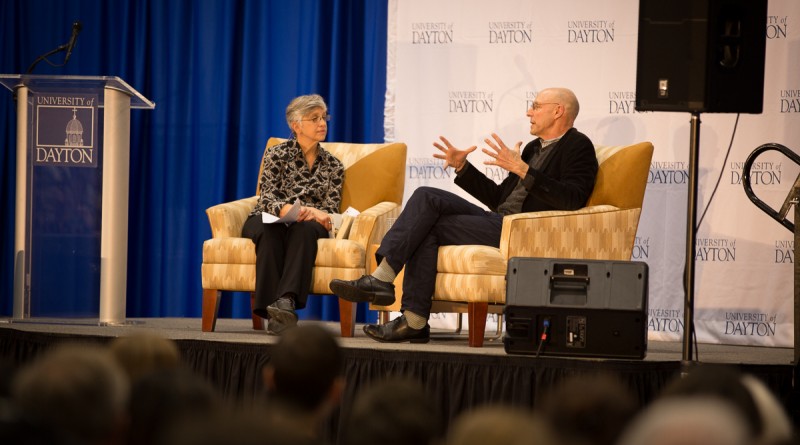Food philosopher’s beef with the American diet
By: Leo Schenk – Junior, Political Science, German
On Thursday, April 21st, UD held their last Speaker Series event for the school year, with author and sustainable food advocate Michael Pollan. His message was one of hope and caution, with the main points being that the modern day American diet isn’t good for Americans, nor is it good for society and culture around it.
His career search into the nature of the western diet began with him attempting to understand the current state of affairs in the food chain for Americans. Discovering that the methods of acquiring food for this country altered tremendously in the 1970’s, in favor of “efficient” mono-cultures, industrial quantities of food, processed food, and a significant amount of red meat.
According to Pollan, this accounts for much in the increase in dietary health problems in this country. He points out that, since 1970, “Americans are eating between 3 and 5 hundred more calories per day, most from sweets.” Framing this as an economic issue, as well as one of public health, he claims that by 2050 “1/3rd of Americans predicted to get type 2 diabetes.” In addition, he claims that the “$35 billion spent on advertising food” to Americans is exorbitant, and why there has been such an increase in food intake to match the increased production.
Pollan advocates for food to have it’s “Proper place.” To do this, Pollan looked to barbecue in the American South, in an attempt to find the most original barbecue style. In eastern North Carolina, he found it. $2.75 per plate, pig, salt, heat and time. “So you can make good food for cheaper than McDonald’s” exclaimed Pollan.
Part of this proper place for food is for it to build relationships and ourselves. Thus, Pollan advocated for cooking with “patience, practice, and presence.”
“When chopping onions, just chop onions.” Named “Therapeutic kitchening,” with a successful application, Pollan believed that this concept could affect social relationships and personal mindsets tremendously for the better. He believes that the actual importance of cooking is much more than the mere act of preparing food. Not only is it a critical life skill, but it’s also of great importance to your mental, social and physical health. “If you are cooking, you will automatically eat healthier,” he advises the crowd.
Another aspect of this concept as he believes it is to have a complete understanding of the nature of food. This means knowing how the food is made, and where it is from. Thus, he explains the nature of cooking, and how it developed based on human’s growth. With the addition of fire, humans didn’t have to eat as much, with the addition of water for boiling, the flavors of most vegetables become added to the mix. Finally, he gets to what, to him, is “the most magical transformation in cooking,” fermentation.
“1/3rd of food is fermented” he points out to make his point come across. He says it is us using the forces of bacteria to cook food for us.
He goes on to analyze the actual nature of our diets, and the fact that they consist of far too much meat, as well as processed food. A potential hopeful are the potential for meat substitutes from plant proteins. In addition to that, Pollan stated in answer to a question, that we needed a “national food policy.”
Overall, Pollan offered many insights for this speech, and left the crowd with the advice “Providing calories is not nourishing people.”

